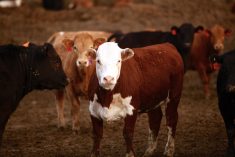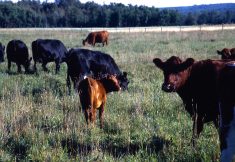One of the top international importers of Canadian beef is back in the market after closing its ports to the product last year.
Agriculture Minister Lawrence MacAulay and Trade Minister Chrystia Freeland on Friday announced Taiwan will again accept beef from Canadian cattle under 30 months of age (UTMs), effective immediately.
Taiwan had pulled the plug on imports of Canadian UTM beef in February last year, following the discovery of Canada’s 19th domestic case of bovine spongiform encephalopathy (BSE) in an Alberta cow.
Taiwan had previously admitted Canadian UTM beef since 2007, when it lifted the restrictions it imposed following the discovery of Canada’s first domestic BSE case in 2003.
Read Also

Mexico agriculture secretary says still no date for restarting cattle exports to U.S.
Mexican Agriculture Minister Julio Berdegue said on Wednesday that Mexico and the United States have not yet set a date to resume Mexican cattle exports amid an outbreak of the flesh-eating screwworm parasite.
Case 19 was unusual in that it was Canada’s first and so far only BSE case to be born after Ottawa imposed an “enhanced feed ban” in 2007. China and South Korea were also among the countries to re-impose beef bans after Case 19’s discovery, but both have since lifted those restrictions.
Admission of Canadian beef products from animals over 30 months of age (OTMs) into Taiwan will “require further discussions” between the countries’ regulators, the Canadian Meat Council said Friday.
“Prior to the initial identification in 2003 of BSE in Canada, exports of beef products to Taiwan exceeded $15 million per year,” CMC executive director Jim Laws said in a release.
“We look forward to regaining our market share during the coming years so that Taiwan will once again become one of the Canadian meat industry’s top 10 export destinations.”
According to the Canadian Cattlemen’s Association, Canadian beef exporters see shipments reaching the $10 million per year range in the short term, and as much as $15 million per year within five years.
According to market development agency Canada Beef, Taiwan in 2014 took 1,776 tonnes of Canadian beef, worth about $13 million, making it Canada’s seventh-biggest beef export market that year. Taiwan imports about 95 per cent of its beef, the agency noted.
“Achieving this access will further enable the work Canada Beef is doing to increase the brand, value and the resulting loyalty for Canadian beef not only in Taiwan, but leveraging this into Southeast Asia,” Canada Beef president Rob Meijer said Friday.
The restored access will likely lead to “initial modest exports” to Taiwan, the agency said, but “importantly sends a message to other world markets affirming the quality and safety of Canadian beef.”
From the producer perspective, CCA president Dan Darling described Taiwan’s decision, and Mexico’s recent decision to restore full access for Canadian beef, as significant in that they mark the removal of some of the few remaining BSE trade restrictions in the world.
Such developments will in turn help instill confidence in Canadian beef producers to grow their herds, Darling said. “All of these market expansions are important; every gain in market access supports competition for Canadian beef.”
During the latest “market disruption,” Canada Beef said, it kept a strong presence in the market through its office in Taipei, “maintaining relationships with key partners and supporting market development initiatives in emerging markets such as Vietnam, Singapore and the Philippines.”
Meanwhile, Meijer said, Canada Beef plans to focus its marketing and brand work in Taiwan on “high-end steakhouses, foodservice and hotel restaurants. With regained access, we have the ability to deliver supplies of Canadian beef to our target customers and further increase brand loyalty, demand and overall value for our product.”
The “most significant” remaining BSE-related market restriction for Canadian beef is China’s ban on bone-in UTM beef, the CCA said, noting the association and the federal government “are continuing to work on” that access. — AGCanada.com Network












